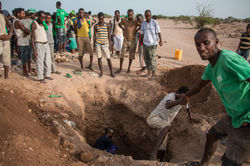
MIGRANTS AND REFUGEES
CROSS PATHS IN DJIBOUTI
Djibouti is unique in the world of migration. It is one of the few places where migrants and refugees brush shoulders, going the opposite direction.
Thousands of Yemeni are escaping the conflict in their home country to wait out the violence in Obock, a port town in Djibouti.
On the other side of the small town, thousands of Ethiopian migrants have set up camp under trees. They are fleeing the worst drought their country has seen in 50 years, attempting to find work in Saudi Arabia.
But in order to reach their destination, they have to pass through Yemen.

Ethiopian migrants finish a multi-week walk through the desert to Obock, Djibouti, where they will attempt to cross the Gulf of Aden to Yemen. This image was taken outside of an International Organization for Migration shelter for migrants -- but due to lack of funds, the shelter can't accept anyone.

Nizar Zinab, 21, a migrant from Ethiopia, poses for a portrait in front of the tree under which he and a few dozen others have set up camp in Obock. He had been waiting two weeks for a trafficker to take him to Yemen.

Mattresses used by Ethiopian migrants stacked up inside an IOM shelter.

The IOM shelter for migrants in Obock, Djibouti. Because of a lack of funds, the shelter can't accommodate migrants on their way to Yemen.

“My advice: carry a knife.”
- Ziad, former human smuggler
Ziad used to smuggle Ethiopians to Yemen before one of his boats sank, killing everyone on board. Though he now works as a fisherman, he still has a piece of advice for migrants.
 |  |  |  |
|---|

Migrants bury a fellow Ethiopian who died just a few kilometers outside of Obock, after completing the dangerous walk through the desert from Ethiopia.
The man, unidentified and likely in his late 20s, is one of many who die during the trek, which usually takes two weeks with temperatures reaching 120 degrees.

Children play football inside the Markazi refugee camp in Obock, Djibouti, which hosts about 1500 Yemeni who have fled the conflict in their country.

"We have no home to go back to, so we must find a way to make a living."
- Haifa Abdul-Raheem Ahmed
Ahmed, a widow with three children, used to run a supermarket in Aden, Yemen, before the war started. Now she plans to open a shop in the Markazi refugee camp.

A Yemeni refugee shows his catch to a supermarket owner in the Markazi refugee camp.

Salim Jaafar (right), camp manager for UNHCR, helps refit a refugee shelter with ventilation as temperatures can reach 120 degrees.

The Markazi refugee camp in Obock, Djibouti, where about 1500 Yemeni are waiting out the war in their home country.

A Yemeni refugee makes flatbread in a restaurant in Obock, Djibouti.

The most popular restaurant in Obock is run by Yemeni refugees.

Abdillahi Bashraheel, 64, shows off his garden in the Markazi camp.

After failing to secure passage to Yemen from a trafficker, four Ethiopian migrants start the long trek from Obock, Djibouti back to Ethiopia.